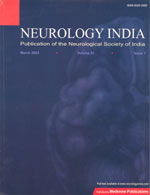
|
Neurology India
Medknow Publications on behalf of the Neurological Society of India
ISSN: 0028-3886
EISSN: 0028-3886
Vol. 52, No. 2, 2004, pp. 206-209
|
 Bioline Code: ni04063
Bioline Code: ni04063
Full paper language: English
Document type: Research Article
Document available free of charge
|
|
|
Neurology India, Vol. 52, No. 2, 2004, pp. 206-209
| en |
Possible relationship between phenylthiocarbamide taste sensitivity and epilepsy
Pal SK, Sharma K, Pathak A, Sawhney IMS, Prabhakar S
Abstract
The study was based on the data of a sample of 400 epileptic patients (200 idiopathic and 200 symptomatic) and 100 normal healthy individuals serving as controls. The PTC threshold distribution was bimodal. The number of non-tasters among idiopathic epileptics (35.5%) and symptomatic epileptics (32.5%) was significantly higher than controls (20%). The relative incidence of non-tasters in idiopathic and symptomatic epilepsies was 2.20 and 1.93 respectively. There is evidence that non-tasters tend to ingest a greater quantity of bitter tasting goitrogenic substances present naturally in edible plants which in turn exert greater thyroid stress in non-tasters or less sensitive tasters. Such a stress during intrauterine or early childhood growth and development might have affected neurological maturation which in turn made them more susceptible to epilepsy than tasters, who faced lesser stress.
Keywords
Idiopathic, symptomatic, epilepsy, PTC taste sensitivity
|
| |
© Copyright 2004 Neurology India.
Alternative site location: http://www.neurologyindia.com
|
|
